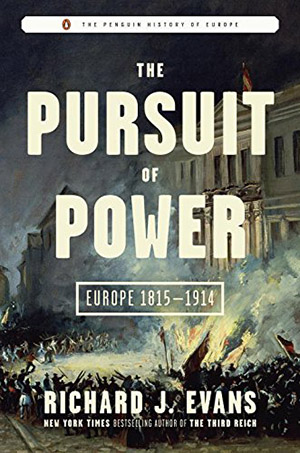[alert variation=”alert-info”]Publisher: Viking
Formats: Hardcover, eBook, Kindle, Audiobook, Audible
Purchase: Powell’s | Amazon | IndieBound | iBooks[/alert]
Richard J. Evans’ The Pursuit of Power: Europe 1815-1914 is the 7th book in the David Cannadine edited Penguin History of Europe series. The book joins other tremendous titles, such as Ian Kershaw’s To Hell and Back, giving us a contemporary anthology of Europe fit for the twenty-first century. Evans’ volume is a wonderfully researched, highly readable, engrossing contribution to the series. His work is one of immediacy that shows how Europe’s 19th century grind of growth and progress ushered the continent into modernity.
The book is divided into eight chapters and each of these are divided further into ten subsections. Evans does a great job of introducing topics and providing enough context that the reader is able to engage with the material without being required to have a deep background in the subject. Evans forgoes footnotes for strong informative writing.
A lot is packed into these pages, but they never drag. Evans allows us to get a great understanding of trends through details while juggling macro information regarding Europe’s process in the 19th century that gives readers a deft sense of the large scale. Each of his ten sections starts with a localized personal story and it is the use of narratives to frame the larger scale history where the book is most effective. We see how big things affected average people and this provides a space for us to enter the text through personal stories.
The book starts at the end of the Napoleonic Wars and moves through the century. The information here on labor struggles, the move from an agrarian society to industrialization, the striving in the countries of the continent for something that resembled Democracy, the talk of food, famine, disease, and machines are all handled incredibly well.
The Pursuit of Power is a big book, the hardcover volume comes in somewhere around 850 pages. Though an enormous undertaking both to produce and to read, Evans handled it all masterfully. We get a front-row seat to how the pursuit of power throughout the century led to much of what makes up modern Europe politically and socially today. The Pursuit of Power is required reading for anyone looking to understand what is at the foundation of today’s global economy, the difficulties between nations, or for those simply wondering how Europe as a whole came to its current form.
[signoff predefined=”Social Media Reminder” icon=”facebook”][/signoff]

